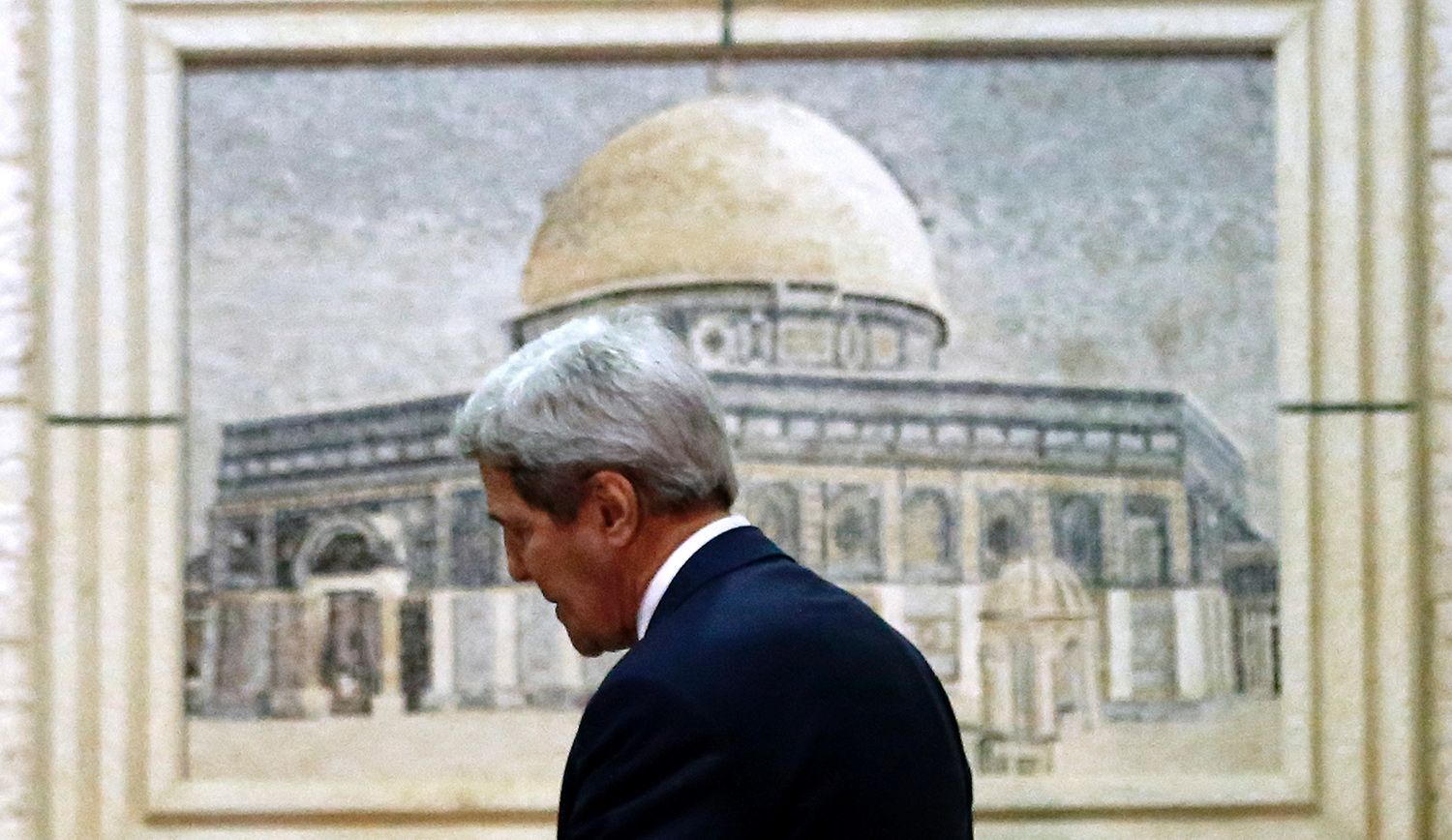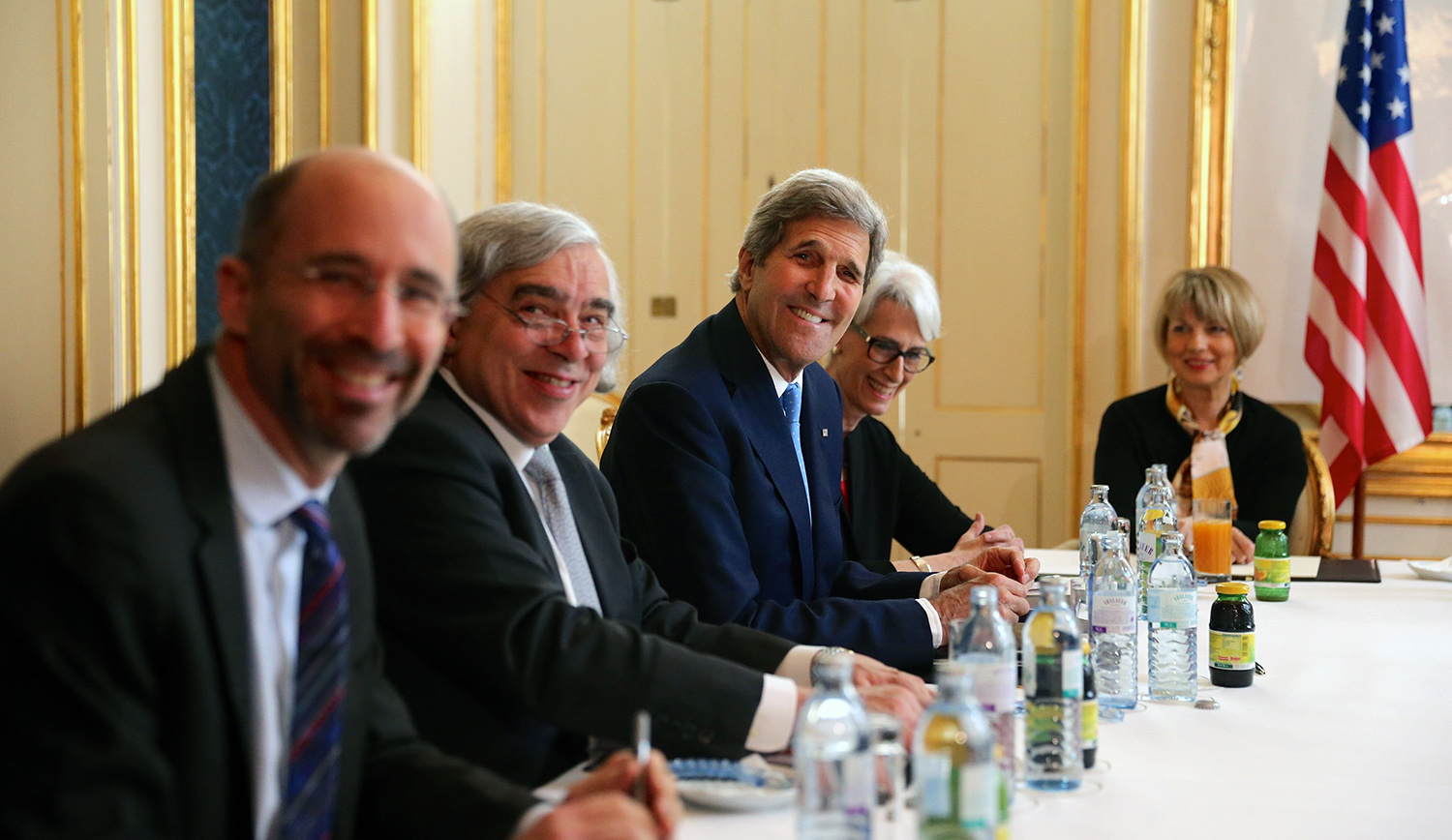For nearly three decades, Shany Mor argues, the peace-processing “guild” has advanced the same ideas about how to broker Arab-Israeli peace—ideas which are not simply questionable, but flat out wrong. The incentives they offer to Arabs and Israelis alike generate the opposite results from the ones that guild members intend. Despite a long list of failures, and despite the fact that individual figures from within the guild have written books acknowledging the shortcomings of their approach, the guild as a body remains wedded to a fuzzy-headed and unchanging conventional wisdom that has proven remarkably resistant to sober-minded reappraisals. Characterized by epistemic closure, the guild’s belief system is protected by two layers of intellectual armor. The first is the certitude that comes from only consuming in-group analyses of the Middle East. The second is a quasi-religious sensibility: the peace processors are men and women on a mission.
The goal of their mission is to save Israel in spite of herself. The key to making peace, the guild sanctimoniously believes, is to restrain Israel, and to force it to compromise. It seeks, Mor writes, “to rescue a fallen Israel, morally compromised by its own hard-fought victories.” The guild treats every Israeli military success as an effort to evade the just and moral course that they, the peace processors sitting in Washington, have mapped out for the Jewish state. Mor, an Israeli, finds the quasi-religious attitudes of the American guild inexplicable. “Why victory makes Israel morally fallen, I’m not sure, because no one has ever managed to explain it to me,” he writes.
I believe I can explain these attitudes. To do so, we’ll need to ask questions not about Israel but about how the guild’s idiosyncratic beliefs first managed to gain a purchase on such a large and diverse group of people. Why do they maintain that purchase even as the original Oslo generation of peace processors begins to retire, and a new generation rises up? In short, what are the origins of the guild’s missionary zeal?
Answering these questions requires a couple of refinements to Mor’s definition of “the guild.” The first refinement concerns his depiction of the socio-political background of the peace processors. “Many of them are Democrats or moderate liberals, but a large cohort also served in the Reagan and both Bush administrations,” he correctly writes. But he adds that the key attitudes of the guild are all but uncontested in elite circles. This claim is an overstatement.
The guild is indeed an elite group with bipartisan membership, but it does not represent, as Mor asserts, an “establishment consensus.” On the right wing of the American political spectrum, the guild’s ideas are hotly contested. Consider the Trump administration. The Republicans who stood opposed to Trump’s rejection of the guild’s dogmas were small in number and limited to elite circles. The party faithful—who had been promised a similar policy agenda by the last many Republican presidential candidates—applauded. As for the George W. Bush administration (in which I served), it certainly contained prominent guild members, but it was also split between the peace processors and their detractors (among whom I number myself). Both staffers and cabinet-level officials lined up on either side of the divide. For his part, President Bush oscillated between the camps, according to circumstance. And even while tacking in the direction of the guild, he displayed an unmistakable gut-level identification with Israel—a firm personal conviction that there should be “no daylight” between the United States and the Jewish State.
And so, while it is true that both Democratic and Republican party national-security professionals may be among the peace processors, the difference is that no such constellation of dissenters existed in the Obama administration—or anywhere else on the political left. As Mor himself reminds us, President Obama came into the office explicitly determined to reverse Bush’s “no daylight” posture. Obama’s personal beliefs only partially explain this determination. Popular political attitudes are also major factor.
Israel sits on a fault line in American politics. Among Republicans support for Israel has soared in the past three decades. According to Pew polling, 79% of Republicans say they sympathize more with Israel than the Palestinians, compared with just 27% of Democrats. That’s a very large gap, fifty-two points. Moreover, the further left you go in the Democratic Party the less sympathetic to Israel you are. Among Democrats who self-identify as moderate or conservative, 35% are more sympathetic to Israel than to the Palestinians; among liberal Democrats, however, only 19% are more sympathetic to Israel.
These data are telling, especially when one remembers that Americans care about Israel in a way that they care about few other countries. The Pew poll, however, does not measure that intensity of feeling. Among Democrats, it is obviously the progressives—that is, the most dynamic and left-leaning element of the party—who feel the strongest about the Israel question. Just last week, on February 4, the Senate voted to keep the US embassy in Jerusalem, and three Democratic Senators voted against. Two of them, Bernie Sanders of Vermont and Elizabeth Warren of Massachusetts, were serious contenders in the last Democratic presidential primary. Both are progressive icons. The progressives are on the march in the party, and they expect Democratic leaders to restrain Israel.
Instead of evaluating the peace processors’ ideas as strategies to deliver peace, we should look at them as performances before domestic American political audiences. Republican presidents expect their foreign-policy advisors to devise diplomatic strategies that can be defended before conservative constituents who are steeped in a philo-Semitic and even Christian Zionist environment; likewise, Democratic presidents expect their foreign policy advisors to devise diplomatic strategies that can be defended before progressive constituents steeped in a “No Justice, No Peace” environment. On the political left in America, there is no intellectual movement pushing against the idea that Israel needs to offer justice to the Palestinians in order to enjoy peace. On the American right, that idea is present but strongly contested.
A second way to refine Mor’s understanding of the guild is to look at the various roles within it. There are three kinds of Democratic “peace processors”: functionaries, opponents, and mediators. The functionaries include men like Tommy Vietor and Ben Rhodes, Obama-administration alumni whom Mor references. Vietor and Rhodes, specifically, are tasked with delivering a political message to the party faithful. But the functionaries also include mid-level diplomatic personnel and their think-tank and journalistic counterparts. Their job is not to wonder why but to process peace until they die.
The second group, the opponents, have a strong animus toward Israel. The representative figure in this group is Matt Duss, who currently serves as Bernie Sanders’ adviser on national security matters, and who is reportedly being considered for a job in the Biden State Department. Duss is much better informed than the functionaries and has more influence among politicians. He is also actively hostile to Israel. He regards its power in the Middle East as oppressive and destructive; its influence in Washington as pernicious. The progressive ideology offers him a way of dressing up his Israel fixation as a commitment to a larger, global cause.
The most intellectually vibrant of the peace processors are the mediators. The dean of this group is, of course, Dennis Ross, who straddles the line better than anyone else in the Democratic party between domestic American politics and Middle Eastern realities. A true strategist, a talented and experienced diplomat, a scholar, and a savvy operator, Ross is very much alive to the dysfunctional aspects of the guild that Mor discusses. In his informative 2015 book Doomed to Succeed, Ross recounts efforts to convince American presidents to avoid offering the kind of perverse incentives that Mor criticizes. But Ross does not have—as indeed no individual advisor has—the power to defy the political imperative on the left to restrain Israel.
Here again, I emphasize the role that domestic politics plays in the activity of the peace processors. As the dean of the mediators, Ross does not simply broker negotiations abroad between Arabs and Israelis but also at home between the Democratic leadership and Jewish American Zionists, who embrace him as one of their own. While Democratic presidents crave the political support of Israel supporters, they must simultaneously cultivate progressives, like Duss, who are hostile to Israel. Part of Ross’s job thus becomes to reassure Israel’s American supporters, telling the jittery among them that the rise of the progressives does not mean that the United States will undermine Israel’s security. Given the surging power of progressives in the party, and given the vehemence of their moral critique of Israel, this aspect of Ross’s work is growing ever more challenging. In the Obama White House, Ross drew fire from progressives inside the administration who resented, as one administration insider told a reporter, the “snake oil” Ross was “peddling.”
The Zionist taint on Ross among progressives is one face of a larger dilemma that Jews confront in the current political climate. Many of them feel torn between their commitment to Israel and their deep identification with a Democratic party that is increasingly critical of the Jewish state. Vocal rejection of progressivism’s dogmas on Zionism is not a realistic response to the challenge, because it will simply lead to the gnashing of teeth. The real choices are either sullen silence, migration from the party, or the adoption of some component of the progressive critique of Israel. Mor presents the guild’s “habits of mind” as attitudes toward Israel—and they certainly are that, but they are also coping mechanisms of the progressive Zionists. When speaking of Israel “you need,” as Mor writes, “to furrow your brow and like a parent who is more disappointed than angry,” you must assert that Israel’s policies “will not achieve its goal but rather backfire on Israel.”
In other words, the only viable strategy for remaining a vocal Zionist and a Democrat in good standing is to join the mission to save Israel in spite of herself. This posture permits expressions of open attachment to the Jewish state while simultaneously distancing the speaker from the dimensions of Israeli life that progressive activists have decided to revile. Mor finds the recent CNAS report on the peace process to be dedicated to the mission to save Israel and thus oddly fixated on the Jewish state and blind to basic Middle Eastern realities. “The report attempts to solve the problems its authors wish to diagnose but not the problems that the region actually confronts,” he writes. Quite right. For some of the authors, the report is doing double duty. While offering ideas about the Middle East, it is also advancing the authors as candidates for Dennis Ross’s position as the dean of the mediators between the American Jewish community and the Democratic party. Whoever Ross’s successor may be, one thing is certain: the rise of progressivism means that he or she will sport a brow locked in a permanent furrow over the missteps of the Israeli government.
But it would be reductive to explain the epistemic closure of the peace processors in purely political terms—as a means of coping with the dictates of progressivism. Indeed, the Israel fixation of the progressives itself requires more explanation. Some observers may be tempted to see anti-Semitism as their major motivating force, but I believe that explanation is largely mistaken. True, progressivism’s Israel fixation can offer camouflage to crafty anti-Semites, but the fixation itself wells up from a source deep in American culture—a source that is not per se hostile to Jews.
Consider Mor’s correct assertion that the guild is both bipartisan and elitist. Today the guild’s center of gravity is on the political left, but in the not-so-distant past it was solidly on the right. In the 1950s, the “habits of mind” that Mor identifies were already in existence, replete with the mania for putting “daylight” between Washington and Jerusalem. But at that time, the individuals who best exhibited that mindset were associated with President Eisenhower, a Republican. At root, the mindset is neither conservative nor liberal.
Since the days of President Truman presidents and their advisors have fallen into two schools: those who regard Israel either as a strategic asset or as a liability. For the former, the Arab-Israeli conflict is but one problem among many in the Middle East, and not necessarily the most important one. Solving it would be a good thing to do, but it’s not crucial to America’s strategic interests in the region. For the latter group, the conflict is an urgent priority, perhaps the top priority in the Middle East. Solving it will improve the position of the United States, not just in the region but throughout the Muslim world. The association of the United States with Israel in the conflict, so the thinking goes, taints America in the eyes of Arabs and Muslims. Israel is the primary obstacle to the achievement of this solution, and America is misguided in its stubborn support of the very obstacle that it must overcome. The goal of peacemaking, in this latter mindset, requires that the United States distance itself from Israel in order to broker a just deal.
When understood in their wider historical context, the “habits of mind” that Mor associates with the peace processors are, in truth, the present manifestation of a more enduring tradition in American strategic thinking. It’s useful to distinguish the peace processors—a species—from the Israel-as-liability school—its genus—because the school’s ideas influence issues that are far removed from the narrow confines of Arab-Israeli peacemaking. Take, to give just one example, US-Iranian relations. Those who believe in the wisdom of finding a rapprochement with the Islamic Republic also believe that Israel must be restrained, because it exercises an unwarranted influence on Washington, forcing America into an unwanted and unproductive conflict with Iran. Thus, Obama’s outreach to Tehran and his fidelity to the dogmas of the peace-processing guild are two sides to the same coin.
Those who see Israel as a liability do not see themselves as fixated on the Jewish state. They consider their views to be dispassionate and disinterested, the product of sober assessments by Middle East experts who have no agenda other than to safeguard the national interest. In their eyes, it is the Israel-as-asset school that is the product of an irrational fixation, being rooted not in objective analysis, but in the primordial passions of American Zionists—especially the Christian Evangelicals and religious Jews among them.
When George Ball published with his son a book about the pernicious role of Israel in American politics, he titled it The Passionate Attachment. A banker, diplomat, and former foreign policy advisor to Presidents Kennedy and Johnson, Ball was an Adlai Stevenson’s protégé who cultivated his mentor’s elitist mien. Those who support Israel are emotional and sectarian, Ball believed—but not he! In his own eyes, Ball was working selflessly to save America from the passions of the Zionists. And not just America, but Israel too. Indeed, in 1977 Ball penned the famous Foreign Affairs article entitled, “How to Save Israel in Spite of Herself.”
Ball was a Democrat, but his attitudes were (and continue to be) shared by Republicans who harbor a patrician condescension toward Zionists, or who consider themselves to be the rightful guardians of the national interest. Former Secretary of State James Baker and former Secretary of Defense Robert Gates are but two examples of statesmen who belong in this latter category.
Pressing on, this habit of the American mind is rooted in even deeper ground than domestic politics. For, an examination of the history of the Israel-as-liability school reveals a surprising fact: its origins are every bit as religious as the Israel-as-asset school. It crystallized as a totally coherent worldview in the 1920s, thanks to the confluence of two religious currents. The first of these was Protestant modernism. In the World War I era, when the Protestant modernist movement came into its own, its leading lights—theologians such as Henry Emerson Fosdick and Henry Sloane Coffin—were avowedly anti-Zionist. From the pulpit at the Riverside Church and the lectern at Union Theological Seminary, they articulated a full-blown opposition to the Jewish state, long before Zionism was a particularly live issue in American foreign policy.
While traditional Christian anti-Semitism sometimes found its way into the thinking of the Protestant modernists, their opposition to Zionism was based less on bigotry toward Jews and more on hostility toward their theological opponents who believed in Christian fundamentalism. The modernists sought to realize the brotherhood of man by breaking down religious barriers and building a society based on reason and science. If there was one belief that the modernists abhorred it was Biblical literalism, the bedrock of fundamentalism. And since it was precisely a literal interpretation of scripture that drew the fundamentalists to Zionism, the modernists have always looked askance at Israel.
Protestant modernism has deeply influenced America’s elite culture—its elite secular culture. The fact that Fox News is a bastion of pro-Israel sentiment and America’s universities are temples devoted to Israel criticism is not a coincidence of the current political moment. Zionism sits today not just on the left-right divide in American politics, but on a deeper, theological fault line in American culture. It straddles the divide between the educated elite and those whom the elite regard as the unwashed masses.
The second religious current was a subset of Protestant modernism, namely, missionary cosmopolitanism. The American missionaries serving in the Middle East transmitted to the Protestant modernists back home a highly detailed understanding of America’s place in the world—a prepackaged foreign policy. Hostility to Zionism was the centerpiece of their belief system. Ever since the mid-19th century, these missionaries had been working to develop friendships with Arab Muslims, but the growing push, in domestic American politics, for the United States to support Zionism was leading many Arabs to view the missionaries as representatives of a hostile power. In the eyes of the missionaries, therefore, Zionism was responsible both for generating hostility to the missionary project and for damaging the national interest—two indistinguishable values in their minds.
After the World War II, the United States government was in need of area-studies experts to serve in the CIA and the State Department in order to fight the Cold War. It turned to that class of Americans who were already schooled in the languages and cultures of the Middle East, Protestant missionaries. These recruits made no distinction between their missionary project and the interests of the United States. They infused the American foreign-policy elite with the belief that the key to save the American position in the Middle East was to put “daylight” between Washington and Jerusalem. While the zealous fire of this belief has dimmed considerably among America’s diplomatic corps, it has not gone out entirely. Meanwhile, it has continued to burn on university campuses and, as we have seen, in the progressive movement, even as it has been shorn of its overt theological complexion.
Thus, among the American elite today, furrowing one’s brow regarding Israeli policies is akin to worrying about climate change. It certainly can be a way of announcing to yourself and the world that you are a progressive, but such a gesture also serves as a signal of a cultural rather than a political affiliation. It is akin to choosing an organic pinot noir over a can of Bud Light.
What Shany Mor’s essay helps us see is that there is much more to the fight about Israel in America than meets the eye. When Americans take a position on Israel, they are not simply talking about Israel—or even about America’s national security. They are also talking about America’s moral character. In short, they are engaging in an internecine fight among Americans about themselves. As a result, the realities on the ground in the Middle East are often an afterthought. And Israeli analysts who try to map elite American attitudes regarding Israel onto a theory of conflict resolution become like soccer commentators calling an American football game.
The solution to the mystery of epistemic closure is that “secular” America still operates in Protestant categories. These categories are mediated through our domestic politics and they are often presented in non-theological terms. But for all that, guild membership is still an article of faith.
More about: Israel & Zionism, Peace Process






